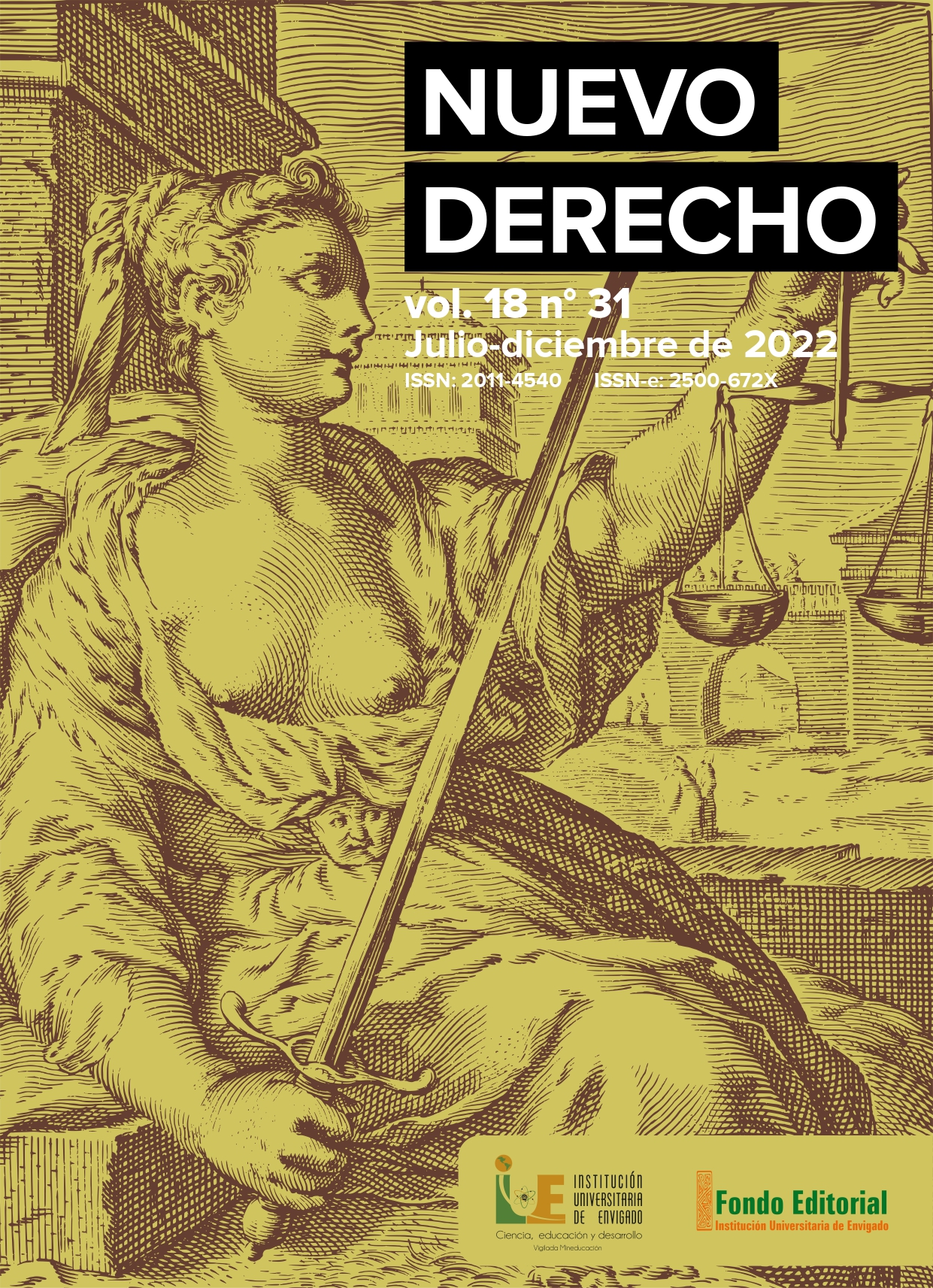Del gobierno a la gobernanza: una aproximación normativa desde lo posmoderno
DOI:
https://doi.org/10.25057/2500672X.1471Palabras clave:
Enfoque posmoderno, Estado posmoderno, Teoría del Estado, Teoría política normativaResumen
Diversos enfoques científicos reconocen un conjunto de elementos constitutivos del Estado moderno, determinantes para su existencia, conservación y perpetuación. El gobierno, como el conjunto de actores, instituciones y procedimientos burocráticos, es uno de ellos. Pero la evolución de este elemento político también ha sufrido las múltiples transformaciones de las últimas décadas. Las fuerzas posmodernas de la economía capitalista, la revolución tecnológica o la cultura del Consumo han impactado, impregnado y modificado sustancialmente su naturaleza, estructura y Funcionamiento. En este contexto, este artículo indaga sobre la relación entre gobierno y posmodernidad a partir de tres elementos neurálgicos: la eficacia, la organización multinivel y la transferencia de políticas públicas. Para ello, utiliza una metodología propia de la teoría política, particularmente las contribuciones normativas enmarcadas en el macro molde posmoderno y, subsidiariamente, en la teoría del Estado.
Biografía del autor/a
Juan Camilo Puentes Sánchez, Universidad de Antioquía. Colombia
Abogado de la Universidad Militar Nueva Granada, Colombia
Magíster en Democracia y Buen Gobierno y doctorando en Estado de Derecho y Gobernanza Global de la Universidad de Salamanca, España
Docente de la Universidad Eafit, Colombia
Docente de la Universidad de Antioquia, Colombia
Correo electrónico: juanpuentes30@gmail.com
Referencias bibliográficas
Anderson, C. J.; Hecht, J. D. (2015). Happiness and the Welfare State: Decommodification and the Political Economy of Subjective Well-Being. En P. Beramendi; S. Hausermann; H. Kitschelt; H. Kriesi (eds.), The Politics of Advanced Capitalism (pp. 357-380). Cambridge University Press. https://doi.org/10.1017/CBO9781316163245.015
Bache, I.; Flinders, M. V. (2005). Multi-level Governance. Oxford University Press. https://doi.org/10.1093/0199259259.001.0001
Bauman, Z. (2000). Liquid Modernity. Polity Press.
Bauman, Z. (2007). Consuming Life. Polity Press.
Bauman, Z.; Bordoni, C. (2014). State of Crisis. Polity Press.
Beardsworth, R. (2015). From Moral to Political Responsibility in a Globalized Age. Ethics & International Affairs, 29(1), 71-92. https://doi.org/10.1017/S0892679414000781
Bennett, C. J. (1991). What Is Policy Convergence and What Causes It? British Journal of Political Science, 21(2), 215-233. https://doi.org/10.1017/S0007123400006116
Bevir, M. (2007). Governance. En M. Bevir (ed.), Encyclopedia of Governance: Vol. I (pp. 364-381). SAGE.
Bevir, M. (2009). Key Concepts in Governance. SAGE.
Bevir, M. (2010). The SAGE Handbook of Governance. SAGE.
Brinkerhoff, D. W.; Brinkerhoff, J. M. (2002). Governance Reforms and Failed States: Challenges and Implications. International Review of Administrative Sciences, 68(4), 511-531. https://doi.org/10.1177/0020852302684002
Buntaine, M. T. (2015). Accountability in Global Governance: Civil Society Claims for Environmental Performance at the World Bank. International Studies Quarterly, 59(1), 99-111. https://doi.org/10.1111/isqu.12145
Cerny, P. G. (1999). Globalization, governance, and complexity. En J. A. Hart; A. Prakash (Eds.), Globalization and Governance (pp. 188-212). Routledge.
Chandler, J. A. (2001). Local Government Today. Manchester University Press.
Chang, H.-J. (2002). Kicking Away the Ladder: Development Strategy in Historical Perspective. Anthem Press.
Colomer, J. M. (2010). Governance. En G. T. Kurian; J. E. Alt; S. Chambers; G. Garrett; M. Levi; P. D. Mcclain (eds.), The Encyclopedia of Political Science (pp. 687-691). CQ Press.
Dahl, R. A. (2020). On Democracy. Yale University Press. https://doi.org/10.2307/j.ctv18zhcs4
Dolowitz, D.; Marsh, D. (1996). Who Learns What from Whom: A Review of the Policy Transfer Literature. Political Studies, 44(2), 343-357. https://doi.org/10.1111/j.1467-9248.1996.tb00334.x
Dolowitz, D. P. (1998). Learning from America: Policy Transfer and the Development of the British Workfare State. Sussex Academic Press.
Evans, M. (Ed.). (2017). Policy Transfer in Global Perspective. Routledge.
Fawcett, P.; Marsh, D. (2012). Policy Transfer and Policy Success: The Case of the Gateway Review Process (2001–10). Government and Opposition, 47(2), 162-185. https://www.jstor.org/stable/26350262
Feldman, F. (2010). What Is This Thing Called Happiness? Oxford University Press. https://doi.org/10.1093/acprof:oso/9780199571178.001.0001
Ferreira, G. (2008). Good Governance and the Failed State. The Comparative and International Law Journal of Southern Africa, 41(3), 428-448. https://www.jstor.org/stable/23253194
Fischer, F. (2014). Participatory Governance: From Theory to Practice. En D. Levi-Faur (ed.), The Oxford Handbook of Governance (pp. 457-471). Oxford University Press.
Frow, J. (1997). Time and Commodity Culture: Essays in Cultural Theory and Postmodernity. Clarendon Press.
Giddens, A. (2013). The Third Way and its Critics. Polity Press.
Greiling, D.; Halachmi, A. (2010). Accountability and Governance Issues: Introduction to Country Studies. Public Administration Quarterly, 34(3), 264-270. https://www.jstor.org/stable/41288357
Greve, B. (2010). Happiness and Social Policy in Denmark. En B. Greve (Ed.), Happiness and Social Policy in Europe (pp. 136–145). Edward Elgar Publishing. https://doi.org/10.4337/9781781000731
Hadjiisky, M.; Pal, L. A.; Walker, C. (Eds.). (2017). Public Policy Transfer: Micro-Dynamics and Macro-Effects. Edward Elgar Publishing.
Hale, T.; Held, D. (eds.). (2018). Handbook of Transnational Governance: Institutions and Innovations. Polity Press.
Han, B.-C. (2015). The Burnout Society. Stanford University Press.
Han, B.-C. (2018). The Expulsion of the Other: Society, Perception and Communication Today. Wiley.
Harvey, D. (1997). The Condition of Postmodernity: An Enquiry into the Origins of Cultural Change. Blackwell Publishers.
Heinelt, H. (ed.). (2018). Handbook on Participatory Governance. Edward Elgar Publishing.
Hirschmann, G. (2020). Accountability in Global Governance: Pluralist Accountability in Global Governance. Oxford University Press. https://doi.org/10.1093/oso/9780198861249.001.0001
Jessop, B. (2002). Governance and Meta-governance in the Face of Complexity: On the Roles of Requisite Variety, Reflexive Observation, and Romantic Irony in Participatory Governance. En H. Heinelt; P. Getimis; G. Kafkalas; R. Smith; E. Swyngedouw (eds.), Participatory Governance in Multi-Level Context. Concepts and Experience (pp. 33-58). VS Verlag für Sozialwissenschaften. https://doi.org/10.1007/978-3-663-11005-7_2
Jones, B. (2013). ‘Good governance’ and ‘state failure’: Genealogies of imperial discourse. Cambridge Review of International Affairs, 26(1), 49-70. https://doi.org/10.1080/09557571.2012.734785
Joppke, C. (1987). The Crisis of the Welfare State, Collective Consumption, And the Rise of New Social Actors. Berkeley Journal of Sociology, 32, 237-260. https://www.jstor.org/stable/41035366
Kennett, P. (2008). Introduction: Governance, the State and Public Policy in a Global Age. En P. Kennett (ed.), Governance, Globalization and Public Policy (pp. 3-18). Edward Elgar Publishing.
Kirton, J.; Larionova, M. (eds.). (2017). Accountability for Effectiveness in Global Governance. Routledge.
Kooiman, J. (1993). Social-Political Governance: Introduction. En J. Kooiman (ed.), Modern Governance: New Government-Society Interactions (pp. 1-8). SAGE.
Lachapelle, G., & Oñate, P. (2018). Introduction. En G. Lachapelle & P. Oñate (Eds.), Borders and Margins: Federalism, Devolution and Multi-Level Governance (pp. 17–30). Verlag Barbara Budrich. https://doi.org/10.2307/j.ctvddzgdk
Levi-Faur, D. (2014a). From “Big Government” to “Big Governance”? En D. Levi-Faur (Ed.), The Oxford Handbook of Governance (pp. 3-18). Oxford University Press.
Levi-Faur, D. (ed.). (2014b). The Oxford Handbook of Governance. Oxford University Press.
Lipovetsky, G. (1996). El imperio de lo efímero. La moda y su destino en las sociedades modernas. Anagrama.
Lipovetsky, G. (2003). La era del vacío. Ensayos sobre el individualismo contemporáneo. Anagrama.
Lipovetsky, G.; Charles, S. (2006). Los tiempos hipermodernos. Anagrama.
Losada Lora, R.; Casas Casas, A. (2008). Enfoques para el análisis político. Historia, epistemología y perspectivas de la ciencia política. Editorial Pontificia Universidad Javeriana. http://hdl.handle.net/10554/42463
MacIntyre, A. (2007). After Virtue: A Study in Moral Theory (3rd ed.). University of Notre Dame Press.
McHale, B. (2015). The Cambridge Introduction to Postmodernism. Cambridge University Press. https://doi.org/10.1017/CBO9781139108706
Moran, M. (1988). Crises of the Welfare State. British Journal of Political Science, 18(3), 397-414. https://doi.org/10.1017/S0007123400005172
Pacek, A.; Radcliff, B. (2008). Assessing the Welfare State: The Politics of Happiness. Perspectives on Politics, 6(2), 267-277. https://www.jstor.org/stable/20446694
Peters, B. G. (2015). State Failure, Governance Failure and Policy Failure: Exploring the Linkages. Public Policy and Administration, 30(3-4), 261-276. https://doi.org/10.1177/0952076715581540
Pettit, P. (1999). Republicanism: A Theory of Freedom and Government. Oxford University Press. https://doi.org/10.1093/0198296428.001.0001
Pierre, J.; Peters, B. G. (2018). Governance, Politics and the State. Springer Nature.
Pierson, C. (2011). The Modern State (3rd ed.). Routledge. https://doi.org/10.4324/9780203810484
Radaelli, C. M. (1995). The Role of Knowledge in the Policy Process. Journal of European Public Policy, 2(2), 159-183. https://doi.org/10.1080/13501769508406981
Rhodes, R. A. W. (1997). Understanding Governance: Policy Networks, Governance, Reflexivity and Accountability. Macmillan.
Richards, D.; Smith, M. J. (2002). Governance and Public Policy in the United Kingdom. Oxford University Press.
Rose, R. (1991). What is Lesson-Drawing? Journal of Public Policy, 11(1), 3-30. https://doi.org/10.1017/S0143814X00004918
Rothstein, B. (2010). Happiness and the Welfare State. Social Research, 77(2), 441-468. https://www.jstor.org/stable/40972225
Schakel, A. H.; Hooghe, L.; Marks, G. (2015). Multilevel Governance and the State. En S. Leibfried; E. Huber; M. Lange; J. D. Levy; J. D. Stephens (eds.), The Oxford Handbook of Transformations of the State (pp. 269-285). Oxford University Press. https://doi.org/10.1093/oxfordhb/9780199691586.013.14
Schuppert, G. F.; Zürn, M. (eds.). (2009). Governance in einer sich wandelnden Welt. VS Verlag für Sozialwissenschaften Wiesbaden. https://doi.org/10.1007/978-3-531-91066-6
Stoker, G. (1991). The Politics of Local Government. Red Globe Press London. https://doi.org/10.1007/978-1-349-21516-4
Stone, D.; Porto de Oliveira, O.; Pal, L. A. (2020). Transnational Policy Transfer: The Circulation of Ideas, Power and Development Models. Policy and Society, 39(1), 1-18. https://doi.org/10.1080/14494035.2019.1619325
Suikkanen, J. (2020). Contractualism. Cambridge University Press. https://doi.org/10.1017/9781108670814
Tortola, P. D. (2017). Clarifying Multilevel Governance. European Journal of Political Research, 56(2), 234-250. https://doi.org/10.1111/1475-6765.12180
Ugyel, L.; Daugbjerg, C. (2020). Successful Policy Transfer and Public Sector Reform in Developing Countries. Policy & Politics, 48(4), 603-618. https://doi.org/10.1332/030557320X15786631116992
Walker, P. E.; Shannon, P. T. (2011). Participatory Governance: Towards a Strategic Model. Community Development Journal, 46(Supplement 2), 63-82. https://doi.org/10.1093/cdj/bsr011
Zürn, M. (2003). Globalization and Global Governance: From Societal to Political Denationalization. European Review, 11(3), 341-364. https://doi.org/10.1017/S1062798703000322
Cómo citar
Descargas
Descargas
Publicado
Número
Sección
Licencia
Derechos de autor 2022 Nuevo Derecho

Esta obra está bajo una licencia internacional Creative Commons Atribución-NoComercial-CompartirIgual 4.0.
Los autores deben declarar que el artículo es un trabajo original, que no ha sido total ni parcialmente publicado en ningún medio impreso o electrónico, que no ha sido remitido simultáneamente a otra publicación y que no se encuentra actualmente en proceso de evaluación en otra publicación. Por otra parte, dejo(amos) constancia que las afirmaciones vertidas en el mismo son de exclusiva responsabilidad de las/los autoras/es.
Todos los datos y las referencias a materiales ya publicados están debidamente identificados con su respectivo crédito e incluidos en las notas bibliográficas y en las citas que se destacan como tal y, en los casos que así lo requieran, cuento con las debidas autorizaciones de quienes poseen los derechos respectivos; en caso de presentarse cualquier litigio o reclamación relacionada con los derechos de propiedad intelectual, nos hacemos responsables exonerando de responsabilidad a Nuevo Derecho
Si el artículo es aprobado para su publicación, los autores transfieren los derechos de reproducción a la revista Nuevo Derecho para publicarlo, distribuir copias electrónicas e incluirlas en servicios de indización, directorios o bases de datos nacionales e internacionales en Acceso Abierto, bajo la Licencia Creative Commons Atribución-NoComercial-CompartirIgual 4.0 Internacional (CC BY-NC-SA) por la cual los autores conservan sus derechos autorales y les permiten a otras personas copiar y distribuir su obra, siempre y cuando reconozcan la correspondiente autoría y no se utilice la obra con fines comerciales.
Por lo tanto, Nuevo Derecho no retiene los derechos de reproducción o copia (copyright), por lo que los autores podrán disponer de las versiones finales, para difundirlas en repositorios institucionales, blogs personales o cualquier otro medio electrónico o impreso, con la sola condición de hacer mención a la fuente original de publicación, en este caso Nuevo Derecho

| Estadísticas de artículo | |
|---|---|
| Vistas de resúmenes | |
| Vistas de PDF | |
| Descargas de PDF | |
| Vistas de HTML | |
| Otras vistas | |




